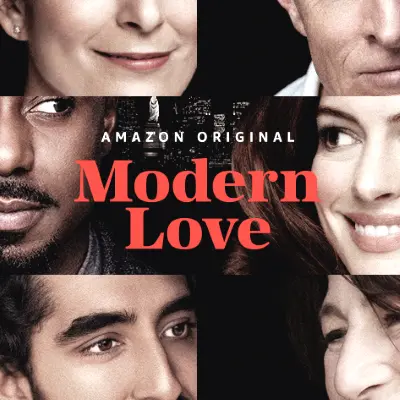Amazon's Modern Love is perfect for hate-watching
-

The Amazon series based on The New York Times column of the same name "once more proves what Orson Welles said: 'I hate television. I hate it as much as peanuts. But I can’t stop eating peanuts,'" says Hank Stuever. "Ol’ Orson might be surprised how many viewers in 2019 are drawn to watching shows for the sole purpose of loathing them ('hate-watch' being a common verb), or that TV as we know it now serves up peanuts eight, 10, 12 bowls at a time. Modern Love is eight deadly episodes long. You won’t notice its effects until it has already poisoned you, and if you watch all of them and find it in any way pleasing or relatable, then I’m afraid to say it’s over between us. (It’s not me; it’s you.) If, however, you watch the show as a means of bile deployment, then scooch over and let’s not enjoy it together, two shriveled hearts cuddled as one."
ALSO:
- Modern Love is mostly a sweet and decadent show, but it's too focused on the upper class: "For all its positives, Modern Love fumbles a bit when binged as a whole and the anthology’s major blind spot becomes obvious," says Meghan O'Keefe. "The characters are almost all upper class New Yorkers living in spacious pre-war apartments, filling their idle hours with movies, tennis, and restaurant hopping. It feels as though a whole swath of modern life is overlooked. Plus, the opening credits don’t match the show itself. Each episode opens with a whimsical slideshow of lovers being very much in love. These photos represent different times, classes, races, and milieus, but always romantic love. Modern Love is fixed on the concept of love as it pertains to New York’s wealthy class, and not this kaleidoscope of passion."
- Modern Love is mostly concerned with bland, heterosexual "love": "Modern Love frequently falls flat," says Pilot Viruet. "Sometimes it crawls toward something good only to suddenly fall backwards while other times it starts off bad and just gets worse, like a late-season installment that actually includes 'daddy issues' in the episode’s description. Despite the various stories—a married couple on the brink of the end, an early date that ends up in the hospital, etc.—the series doesn’t actually feel much different from episode to episode. (It also doesn’t help that they’re practically verbatim from the column and that when they do stray, it’s to eschew the most interesting parts of the essays.) For the most part, Modern Love is concerned with bland, heterosexual 'love' (the one exception is an episode about a gay couple who adopt a child from a homeless woman) and each installment coasts to its respective, predictable ending without much to say in between."
- It's like a good first date that will let you down in the long run with its privilege and insensitivity: "Modern Love is dripping with romantic optimism and gooey meet-cutes that put a smile on my face. But it's just as overwhelmed with privilege and insensitivity," says Alison Foreman. "While I'd like to judge each episode separately — and to some extent I have — this show is a package, a fact underscored by its saccharine Love Actually finale. Yes, Modern Love took me on some great dates, and I'll always cherish the time we had together. But knowing what I know now, knowing that this show wouldn't come through in the ways that matter most, I'm happy we're parting ways."
- Most of the stories are sincere, thoughtful and generous of spirit: "Modern Love is, like many relationships, imperfect, but its heart is in the right place, and that goes a long way," says Alan Sepinwall, adding: "It helps that the actors are so good."
- There's something refreshingly earnest in Modern Love: "The column Modern Love has run for a decade and a half; if the personal essay boom is indeed over, Modern Love is uncowed," says Rumaan Alam. "Some installments are more memorable than others, some writers more capable, and because it’s ever changing by design, what endures are the words Modern Love. However you judge it as a column, you must admit it’s an astonishing success as a brand. Modern Love the show is an anthology—discrete stories united by an overarching sensibility of rigorous, almost humorless, sincerity. There’s nothing tongue in cheek about it; it’s dead serious about love. You can call it schmaltz if you like, but that’s powerful stuff."
- Modern Love is charming, but uneven: "Modern Love, when it works, provides the kind of soothing comfort supplied by an inviting armchair, a warm fire, or a mug of hot tea on a chilly night," says Maureen Ryan. "It’s the TV equivalent of a hand-knit cardigan or an Instagrammable latte; a mood of transitory wistfulness appears to be the goal, not some chest-thumping artistic statement about Life. And there’s certainly room for this kind of artisanal woolly sweater on the TV scene: The real world and the headlines it generates are not much fun these days, and when the actors in the best-written Modern Love installments are on their A-games, it’s hard to resist the appeal of these amiable, slightly world-weary stories of connection in the big city."
- Think of Modern Love is like Black Mirror, but with feelings
- There are times when watching Modern Love feels like watching a bizarro, rom-com version of Amazon's The Romanoffs
TOPICS: Modern Love, Prime Video, The New York Times
More Modern Love on Primetimer:
